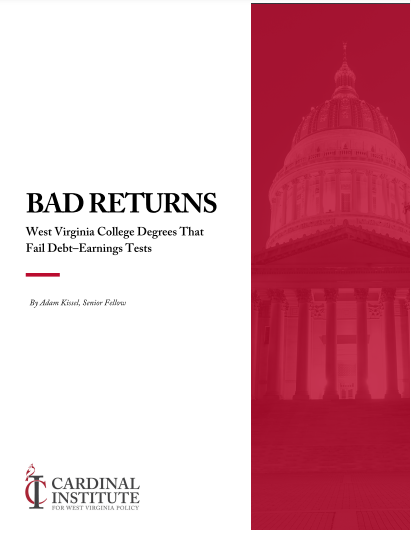Bad Returns: Student Debt Compared to Earnings
Download PDF
Executive Summary
The U.S. Department of Education’s gainful-employment rule, which aimed to cancel funding to degree programs in which graduates had too much debt relative to income, is threatening to return. The department specifically targeted for-profit colleges. But this study uses new data on student loan debt and early-career earnings to identify dozens of troubled programs at public colleges and universities in West Virginia. By the Department of Education’s gainful-employment standards, this report identifies 21 failing and 64 probationary programs, compared with 118 that pass.
Furthermore, the gainful-employment rule assesses programs only on the basis of debt payments rather than overall student loan debt. A more complete debt-to-income measure shows that 8 of those 118 “passing” programs produce graduates with concerning levels of debt.
Together, the 93 programs graduate about 5,500 students per year. Students and parents should beware of these bad bets, colleges should end or improve these programs, and lawmakers should hold their institutions accountable.
Associate degree programs perform extremely well in West Virginia by these measures. Since their graduates’ debt is very affordable in relation to their graduates’ income, there is no public policy reason to “increase affordability” by further subsidizing this level of college or make it “free.”
This report ranks the best 50 programs by these financial measures, recognizing that while income is not necessarily the primary reason to go to college, public institutions must be assessed for the financial outcomes of their graduates and held to account when their students do not earn enough to repay their student loans.
Introduction
West Virginia students, parents, corporations, and taxpayers rely on our colleges and universities to produce graduates ready to contribute to the community and lead fulfilling lives. Dozens of programs statewide do so. However, dozens more leave their students with dangerous levels of student loan debt, forcing taxpayers to pay when the graduates default on their loans. Their income, two years after graduation, does not justify the tuition they paid and the loans they amassed.
The latest data from the U.S. Department of Education provide sufficient information to assess 203 programs in the state, corresponding to about 73 percent of all students. Following the department’s gainful-employment (GE) test, which was developed during the Obama Administration, rescinded by the Trump Administration, and in danger of return under the Biden Administration, this report identifies 21 failing programs, which produce nearly 1,300 graduates each year. In addition, 64 programs would qualify for probation. These programs leave their students with too much debt relative to their post-graduation earnings, contributing to the growing student debt crisis.
Furthermore, taxpayers are on the hook for unpaid debt. Therefore, this report also assesses programs on the basis of total program debt per graduate. Under this measure, 8 programs that would pass the GE test also produce graduates with concerning levels of debt.
Programs should be held accountable for student outcomes. Empowering stakeholders with knowledge of which programs should be either improved or canceled will contribute to this end.
This paper is written by Adam Kissel, senior fellow for the Cardinal Institute for West Virginia Policy.
